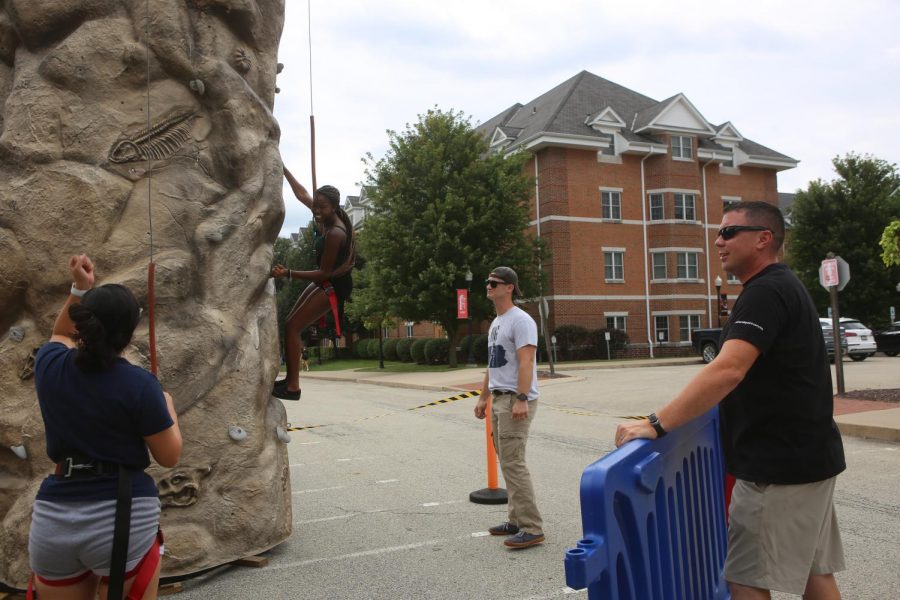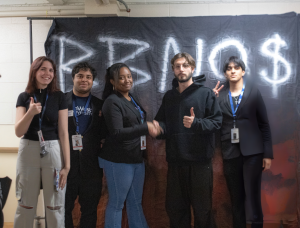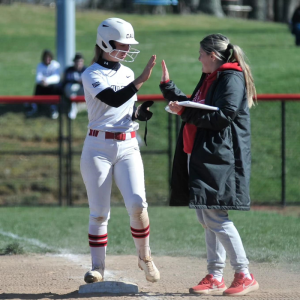Students climb upwards with help from Cal U’s military recruiters
ROTC) Instructors teach students to climb the wall.
September 17, 2021
On the main street of campus in front of Natali Student Center students climbed to new heights and possibilities with the help of the California University of Pennsylvania’s military recruiters.
National Guard Liaison and Reserve Officers’ Training Corps (ROTC) Instructor, Sgt. 1st Class Patrick Burgess has filled the call of duty to his country with service in both the Marine Corp. and the PA Army Guard over the last 20 years.
“Serving this country has been the highlight of my career, and when I left the Marines after my time there was up, I missed it instantly and enlisted in the Army Guard shortly after,” said Burgess.
Burgess now puts his military experience and knowledge to use at California University of Pennsylvania as a recruiter for both the Army National Guard and ROTC programs.
“It’s all service, whether that be Guard, Active, or Reserves of any branch, we all have one mission to stand behind,” said Burgess.
CalU, like many state universities, offers students the opportunity to serve in the military ranks while their commitments to the university are being fulfilled.
In exchange for their military service, members are given benefits such as life insurance, medical insurance, schooling benefits for themselves and family, and paid time on-duty.
“When students enlist in the Guard or ROTC they are committing to both serving their country while finishing their degrees. Many of our cadets and recruits balance an active college life and their military commitments,” said Burgess.
Students who enlist in the National Guard commit to a contract through the state in which they go to basic training between or prior to the start of the semester and fulfill a one weekend a month commitment to their assigned unit known as drill, alongside a two week session in the summer.
Many of these types of students have enlisted in the Guard prior to committing to a university because of the required enlistment element in order to obtain educational funding through the state.
Guard members earn school benefits such as the Montgomery GI Bill or the Post 9/11 GI Bill which payout to the member for schooling costs in addition to the Education Assistance Program (EAP) which pays the tuition of a state university.
Recently added to the Guard educational benefits is the Military Family Education Program (MFEP). Under the MFEP, spouses and children of Pennsylvania Army or Air National Guard members can attend Cal U tuition-free.
The MFEP provides five years of higher education benefits to dependents of Guard members who commit to an additional six years of service after their initial contract.
The program provides 10 semesters of tuition-free education for family member(s) at the tuition rate set by Pennsylvania’s State System of Higher Education.
Pfc. Anthony Dibattista enlisted in the PA Army Guard in order to get in better physical shape and use his schooling benefits to enroll at CalU.
“I think it’s important to use the benefits we earn like going to college, it also is great to be a part of the military while I go to school,” Dibattista said.
Similar to the Guard, ROTC scholarships are awarded to cadets in exchange for their active-duty service as an officer upon the completion of their college degree.
Cadets perform more involved tasks through the university such as commitments to military classes and physical fitness training with their instructors.
The ROTC programs are one of the most demanding and successful leadership programs in the country, according to The Today’s Military website, which is produced by the US Department of Defense as a resource for young adults, parents and educators that are interested in military service.
“The training a student receives in Cal’s ROTC program promotes leadership skills, military knowledge and career development that will help the cadet through life outside of school or the military,” Burgess said.
Military classes take place both on campus and in the field, and are mixed with other academic studies. Additional military summer schools such as jump school may also be an option for the cadet depending on the career they have chosen.
Freshman Cadet Shadee Washington felt that her service would be the right choice to help pay for schooling costs.
According to CalU’s homepage, the average cost to attend the university for an undergraduate student who is enrolled for 12-18 credits per semester, lives in university housing, and is a resident of Pennsylvania is $21,088.80 for the academic year.
“I believe students should look at the military as a great option for financial aid,” Washington said. “It helped me figure out how I would afford a college degree and gave me a career after I graduate.”
“Serving in the military creates a family structure that only those who have served can understand,” Burgess said. “It also creates an environment that many of our dual status students thrive in and find to be a great career move later in their life.”
For more information, call California University’s Office of Military and Veterans Affairs at (724)-938-4076 or email [email protected]. Or call Sgt. 1st Class Patrick Burgess at (412)-807-1059 or email at [email protected].







